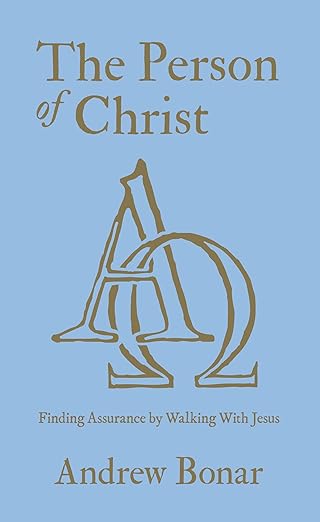A Book Review from Books At a Glance
by Ryan M. McGraw
Sometimes what appear to be the simplest questions are the hardest to answer. What could be more basic to Christianity than the gospel of Jesus Christ? Yet how would you summarize the gospel in a single sentence or, if needed, in a word or two? Andrew Bonar, who ministered in Scotland in the nineteenth century wrote, “the person of Christ is, and always has been, the essence of the gospel” (13). Though sounding like a simple, if not obvious point, Bonar put his finger on a recurring problem, creeping continually into Christian thought. Often, Christ’s benefits, whether justification, adoption, sanctification, or glorification, become the gospel, displacing Christ’s person with his work. Though some might think this distinction overly-subtle, Bonar drives home the fundamental idea that Christ is more important than his benefits, and he should be so to believers. Every Christian needs what this book has to offer, and the best Christian theology historically has struck the same note that Christ is the gospel.
Bonar’s six brief chapters emphasize Jesus as the gospel progressively from several different angles. First, he states the fact that Christ is the gospel. Second, he reinforces this fact from the Old Testament to the time of the apostles. Third, he shows that preaching Christ’s person is the true path to conviction of sin and to applying the gospel properly. Fourth, only Christ’s person can give believers peace that passes understanding, in prosperity and adversity. Fifth, meditation on Christ’s person, rather than merely his work, is the only certain means of growing in holiness. Sixth, and finally, looking to Christ’s person transforms our experience of death as we await Christ’s return in glory.
One of the most striking features of Bonar’s presentation is his realistic depiction of saving faith learning implicit and unquestioning trust in Christ’s person even before believers fully understand what he has done for them. The faith of the Old Testament saints as well as figures like Anna and Simeon in Jesus’ infancy narratives illustrate the point well. Bonar wrote, “They clung to the right person, and committed themselves to his wisdom, and power, and love…They may not see in what manner, or by what process, he is to save them, but cling to his person, and all shall be well” (21). While Scripture requires knowledge of Christ to believe in Christ (Rom. 10:14-17), remembering that what Christ does to save sinners and how well they understand what he has done to save them are two different things. Genuine faith rests fundamentally on the “who” of the Savior, and only consequently on the “what” of salvation. This is not so much an excuse to be content with little knowledge of Christ and salvation as it is an impetus to keep soteriology subordinate to Christology. Pastorally, this led Bonar to counsel parents and churches towards sympathetic patience with children among them. He wrote, “It is thus that little children rest on Christ. With little theology, they know and feel that this is he who died for sinners. Their faith is like that of the Old Testament saints; it is the sheep resting on the shepherd’s shoulders, with little knowledge of how he saves them” (40). Though we should not choose between sound doctrine and Jesus Christ, every generation of Christians is likely tempted to transform a personal gospel, resting on the Trinity and incarnation, into an impersonal list of doctrines. To give one more example, Bonar observed, “The work of Christ, if seen apart from his Person, may give freedom from dread of wrath, but it can scarcely impart that positive delight in his restored friendship, which alone ‘keepeth the heart and mind’” (54).
Perhaps a good test of the vital relevance of Bonar’s meditations is asking, “How central is the Trinity to my conception of the gospel?” How we answer this question serves as the best mirror showing us whether we have reduced the gospel to a vault full of treasures that we never spend, instead of a household where we share life with a divine family. Someone can inherit an estate from a distant relative they never met and have no personal attachment or relationship to that person. However, when God loved his elect and took measures to save his people from their sins, he gave himself to them in the persons of the Son and the Spirit. When believers receive Christ, they receive the Father and the Spirit, who existed before his incarnation, and they receive every benefit of union with Christ, after his resurrection and the application of redemption by way of ascension, session, intercession, and sending the Holy Spirit. Bonar’s little book is gripping, pressing an issue that the church should never tire of pressing: Jesus Christ himself is the gospel, and we would not have it any other way.
Ryan McGraw
Greenville Presbyterian Theological Seminary
